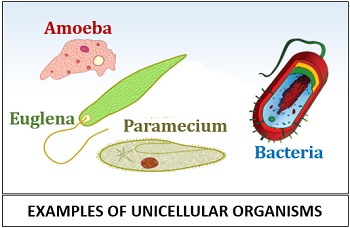Math Is Fun Forum
You are not logged in.
- Topics: Active | Unanswered
Pages: 1
#1 2025-10-27 22:13:36
- Jai Ganesh
- Administrator

- Registered: 2005-06-28
- Posts: 53,012
Unicellular Organisms
Unicellular Organisms
Gist
In biology, the adjective unicellular describes an organism that has only one single cell, like most kinds of bacteria. You're most likely to see the word unicellular in a biology textbook, where it is used to talk about microscopic, single-celled organisms.
Many organisms are unicellular, including bacteria, archaea, protozoa like amoeba and paramecium, and some fungi like yeast. These single-celled organisms perform all necessary life functions within that one cell and are often microscopic, though some can be large enough to see with the naked eye, such as Valonia ventricosa.
Summary
Unicellular organisms are organisms consisting of one cell only that performs all vital functions including metabolism, excretion, and reproduction. Unicellular organisms can either be prokaryotes or eukaryotes. Examples of unicellular organisms are bacteria, archaea, unicellular fungi, and unicellular protists. Even though unicellular organisms are not seen by the naked eye, they have an indispensable role in the environment, industry, and medicine. Some of them may also be infectious or pathogenic to humans, animals, and plants.
Unicellular Definition
What is a unicellular organism? In contrast to multicellular organisms, single-celled organisms — or unicellular organisms — are groups of different living organisms consisting of one cell only. And that cell performs all vital functions, such as homeostasis, metabolism, and reproduction. Moreover, a single cell must be able to obtain and use energy, get rid of wastes, and transport materials. In contrast, multicellular organisms are made up of multiple cells and these cells have specific roles and may function together as a unit (tissue).
The cell of a unicellular organism has a protoplasm that contains various proteins, lipids, carbohydrates, and nucleic acids. The protoplasm is surrounded by a cell membrane that separates the internal components of the cell from the external environment. However, any cell should be able to interact with its external environment to obtain molecules from the outside and expel wastes to the outside.
Are bacteria unicellular? Yes! In fact, not only bacteria are unicellular but also archaea. Both bacteria and archaea are prokaryotic organisms. Unicellularity, though, is not exclusive to prokaryotes. Some eukaryotes live singly as well. Examples of single-celled eukaryotes are the unicellular algae, unicellular fungi, and protozoa.
Most living things composed of only one cell are microscopic and cannot be seen by the naked eyes. Unicellular organisms abound in nature. Even extreme habitats contain unicellular organisms. Some archaea, for instance, can survive in extreme environments, and so they are called extremophiles. They are typically resistant to extreme conditions such as temperature or pH.
Details
A unicellular organism, also known as a single-celled organism, is an organism that consists of a single cell, unlike a multicellular organism that consists of multiple cells. Organisms fall into two general categories: prokaryotic organisms and eukaryotic organisms. Most prokaryotes are unicellular and are classified into bacteria and archaea. Many eukaryotes are multicellular, but some are unicellular such as protozoa, unicellular algae, and unicellular fungi. Unicellular organisms are thought to be the oldest form of life, with early organisms emerging 3.5–3.8 billion years ago.
Although some prokaryotes live in colonies, they are not specialised cells with differing functions. These organisms live together, and each cell must carry out all life processes to survive. In contrast, even the simplest multicellular organisms have cells that depend on each other to survive.
Most multicellular organisms have a unicellular life-cycle stage. Gametes, for example, are reproductive unicells for multicellular organisms.
Some organisms are partially unicellular, like Dictyostelium discoideum. Additionally, unicellular organisms can be multinucleate, like Caulerpa, Plasmodium, and Myxogastria.
Evolutionary hypothesis
The origin of life is largely still a mystery. Primitive protocells are thought to be the precursors to today's unicellular organisms.
In one theory, known as the RNA world hypothesis, early RNA molecules would have been the basis for catalyzing organic chemical reactions and self-replication.
Compartmentalization was necessary for chemical reactions to be more likely as well as to differentiate reactions with the external environment. For example, an early RNA replicator ribozyme may have replicated other replicator ribozymes of different RNA sequences if not kept separate. Such hypothetic cells with an RNA genome instead of the usual DNA genome are called 'ribocells' or 'ribocytes'.
When amphiphiles like lipids are placed in water, the hydrophobic tails aggregate to form micelles and vesicles, with the hydrophilic ends facing outwards. Primitive cells likely used self-assembling fatty-acid vesicles to separate chemical reactions and the environment. Because of their simplicity and ability to self-assemble in water, it is likely that these simple membranes predated other forms of early biological molecules.
Additional Information
A unicellular organism is a living thing that is just one cell. There are different types of unicellular organism, including:
* Unicellular fungi
* Protozoa
* Bacteria
These organisms have adaptations that make them well suited for life in their environment.
Unicellular fungi
Yeast are unicellular fungi. They are used by brewers and wine-makers because they convert sugar into alcohol, and by bakers because they can produce carbon dioxide to make bread to rise. Fungi can also form into mushrooms and toadstools.
Protozoa
Protozoa are unicellular organisms that live in water or in damp places, for example, the amoeba.
Bacteria
Even though a bacterium is just one cell, it can carry out all seven life processes - movement, respiration, sensitivity, growth, reproduction, excretion and nutrition.

It appears to me that if one wants to make progress in mathematics, one should study the masters and not the pupils. - Niels Henrik Abel.
Nothing is better than reading and gaining more and more knowledge - Stephen William Hawking.
Offline
Pages: 1